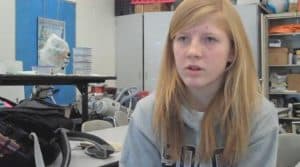The Offal Lesson
CompetencyWorks Blog
The following is reposted from Shawn Cornally from Febuary 2012.

This Friday my classroom was visited by a few Iowa-state legislators. Our school is receiving attention for its work on assessment reform, which is by no means limited to what’s happening in my classroom. Even the most entrenched traditional teachers are experimenting with how they assess, and that means students are engaged with the meta-work of how education is done.
F-T-emereffin-W.
The legislators talked to a panel of teachers and students for about 90 minutes. The students were convincing, the teachers were passionate, and I think everyone left with the impression that schools everywhere should benefit form the successes and failures we’ve had here at Solon:
Failure:Reassessment frenzy. This needs to be controlled and philosophically sound. The students can’t still be addicted to points when you introduce student-initiated reassessments (this took 2 years to hash out)
Success: Students are reporting more retention and enjoyment of school in general. They’re saying things like, “I know what I know.” This is a positive change from how it used to be.
Failure: Students try not to do any practice or studying because it’s not worth credit. It can take up to two months for them to mature, depending on their age. That’s a lot of time.
Success: Students eventually learn that studying and homework are just what normal people call “learning.”
Here is a video of my kids giving feedback.
You can listen to the liner notes here.
The lesson was about offal, which is guts. I got them livers, stomachs, and hearts. I wanted the suits to see what a lesson looks like when you let kids go, and prompt them to show you what they’ve learned. I wanted them to see that competency-based education, mixed with standards-based assessment is a recipe for more engaged students.
My students reported learning the following, again, unprompted:
- Chicken liver is somehow quite different from mammal liver. This framed a good discussion about evolution. We drew a cladogram with chicken, humans, cows, and sheep on it.
- Beef hearts are really big and look a lot like “meat.” They didn’t know it, but they naturally dissected it into each chamber, this will help me a lot later.
- Microscopes are tricky and require super thin samples. Cells are much smaller than the students previously assumed (none were seen)
- Stomachs are not just balls. They have hugely different layers. They absorb liquid readily. They are undulated. They are not as big as you’d think.
- Lots of other stuff got said and discussed that I can’t remember now.
Again, my goal is not necessarily for my students to memorize the word “hepatocyte.” They’re learning much in the way a pre-schooler does; by experiences that they can’t even begin to know what they’ll build on top of later.